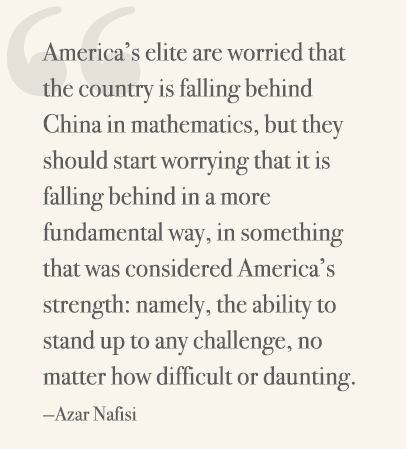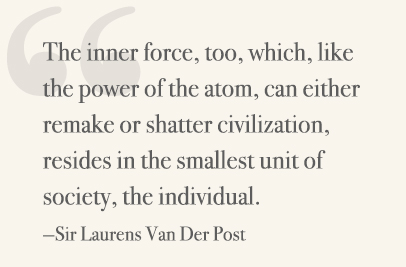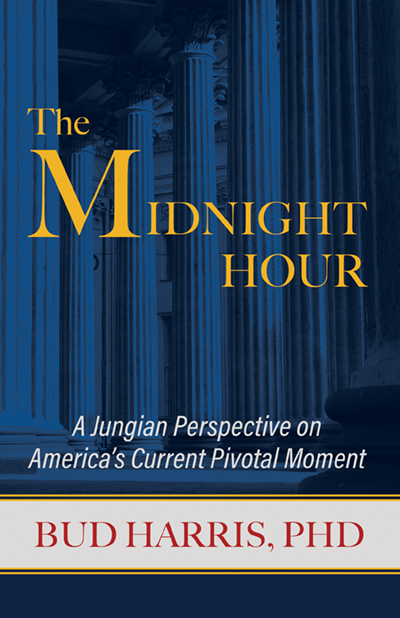Dear Reader,
The following is a continuation of my blog series based on my book The Midnight Hour: A Jungian Perspective on America’s Pivotal Moment. If you are just now picking up on the series, you might start with the Introduction: Welcome to the Challenges of Change.
I hope that it will help you, as writing it has helped me, to find a candle to contribute to your light.
Whether you agree with me or not, I hope my work helps you clarify your own position, both within and to the chaotic times surrounding us. Above all, I hope it helps you create a new vision of the future and a new hope that draws you to commit to it.
Bud Harris
Asheville, North Carolina
The Midnight Hour:
A Jungian Perspective on America’s Pivotal Moment
Chapter 5: Daring to Become Vulnerable, Aware, and Realistic


Living forward, saying “bring it on!” to change, was a lesson I learned from a dream while I was living in denial of my life’s true challenges. At the time, I woke up with a start, drenched with sweat. In the darkness of my dream, an enraged bear was chasing me through the crumbling gray stone walls of a burning castle. My interpretation: the solid structures of my old life were being destroyed, and this great fierce beast from my shadow wanted to devour the old me.
New life, fierceness, and vitality come from our own confrontations with our shadows. These shadows are energies and realities in our lives that we have denied and repressed. When I put myself in a bubble of illusion, or a skewed view of life, and cut myself off from the struggle with what I think are my darker energies and realities, I rob myself of the dynamic, internal conflicts that are needed for my growth, for my quest for wholeness, and for the fulfillment of the inner dream of my potentials. These struggles give me the energetic life force that can ripple out into the world in a beneficial way. And make no mistake about this fact. The things we hide, cover up, and deny within ourselves also ripple out and contribute to the negativity around us and in the world. The first question I had to ask myself was how I got into this isolated, one-sided bubble to begin with.
Barbara Ehrenreich, the well-known author and social commentator, explains one of the key factors that helps reinforce the walls of our bubbles in her very important book Bright-Sided: How the Relentless Promotion of Positive Thinking Has Undermined America. Please read this book—I will mention here a few points that affected me and contributed to maintaining my bubble, but I don’t have the space to fully explain this disaster in our society. Barbara forcefully explains how positive thinking has become an ideology, an unconscious creed, an almost religious dogma that gets structured into most of us as we develop and is always in the background of how we perceive other people and situations. We are taught that having or expressing any kind of negative thought is an unacceptable, unhealthy way of life rather than just a point of view or a realistic reaction to circumstances. This ideology, she states, “encourages us to deny reality, submit cheerfully to misfortune, and blame only ourselves for our fate.”
It infuriates me to realize she is right. Positive thinking, as we experience it, causes us to become delusional, urging us to see the glass as half full when it actually lies shattered on the floor. We are subjects to the tyranny of positive thinking.
When I have said to various people that I don’t believe in positive thinking, they often respond by saying, “Do you think I’m better off by being negative?” or “What good is being negative?” or “What purpose does getting angry serve?” The answers are simple. What is best for us is to let ourselves experience our honest emotional responses to the situations in our lives. These kinds of responses make us real, keep us engaged in life, and make us better able to deal with the reality we are facing.
Barbara Ehrenreich goes on to say:
In addition, positive thinking has made itself useful as an apology for the crueler aspects of the market economy. If optimism is the key to material success, and if you can achieve an optimistic outlook through the discipline of positive thinking, then there is no excuse for failure. The flip side of positivity is thus a harsh insistence on personal responsibility: if your business fails or your job is eliminated, it must be because you didn’t try hard enough, didn’t believe firmly enough in the inevitability of your success. As the economy has brought more layoffs and financial turbulence to the middle class, the promoters of positive thinking have increasingly emphasized this negative judgment: to be disappointed, resentful, or downcast is to be a “victim” and a “whiner”.
I might add to these statements that a number of people take this same position about our physical and mental health.

For decades I thought that whenever I met or talked with anyone—be it family, friends, colleagues, or strangers—I should give the appearance of being positive, happy, and moving toward successful achievements and should present all of my family members in the same light. After all, America’s official belief for decades (for people in my bubble class) was that things are good and getting better. Part of the shock of the economic crash of 2008 and the election of 2016 has been the direct confrontation between that belief system for people in the bubble and the reality of everyone else. Since the election, it has been much harder to hold on to the habit of positive thinking. Awakening from nightmares can shatter our delusions.
As I reflected on how I became more entrenched in my bubble, I realized that I had been working so hard on my vocation, my writing, and my family concerns that I had denied many of my deepest feelings and fears. I had also forgotten that what happens to one of us in our society also affects all of us and the climate of the culture we live in. I had also banished many of my strongest social concerns into a twilight zone where I was only semiconscious of them. In fact, the circumstances of my life and spirit had been deeply hurt by our economic disaster in 2008 and the collapse of our mental health systems, the harshness and greed of our medical insurance systems, the student debt in my family, and the lack of job security for the generations in my family following me.
If we deny or fail to accept the seriousness of our outrage, frustration, bitterness, and fear long enough in general or particular areas (in my case, those broader social concerns that actually affected me deeply) we can soon seem to forget we have these feelings and not know how to articulate them. But, as Dr. Jekyll discovered, when we close our eyes and ears to our feelings, whether they are within ourselves or within our collective social character, they don’t go away. They fester inside. Keeping them repressed requires more energy, and that causes increasing unconscious stress. Then we only know that we feel sluggish, depressed, and out of sorts, or we have problems with our spouses and children, or we have problems with our weight, or we eat or drink or even exercise too much.
One of our best defenses against facing our reality is to scapegoat some part of ourselves, some perceived weakness, such as a weakness for food, sex, alcohol, reading mysteries, and so forth. Then we can get into an emotional gridlock of struggling with ourselves over our lack of self-control and avoid facing our real reality altogether. In reality, our social character—our collective “we”—follows a similar pattern.
The bone-deep brainwashing into positive thinking that I was subject to growing up has kept me from looking at the bigger picture of different people’s circumstances in our society. It has also kept me from fully seeking to understand the nature of their experiences and their lives and how our blindness is affecting them. I have many concerns about our society, and I’m sure you have your own. But my indoctrination particularly limited my perspective on reality in the following five areas: (1) the American dream, (2) people in poverty, (3) health care, (4) mental health care, and (5) the economic crash of 2008. As I discuss each area, I will explain the bubble I was in, give voice to my dark shadow—the honest feelings I repressed—give voice to my golden shadow, which gives hope, and describe some of my ideas as to how I would like to see these challenges met.
 The above is Chapter 5 of my book The Midnight Hour: A Jungian Perspective on America’s Current Pivotal Moment.
The above is Chapter 5 of my book The Midnight Hour: A Jungian Perspective on America’s Current Pivotal Moment.
BUY FROM YOUR LOCAL INDEPENDENT BOOKSTORE
Book Excerpts and Resources
, 2021, America, being human, Carl Jung, citizenship, Elder Wisdom, fear, hope, living authentically, shadow work
Please stay positive in your comments. If your comment is rude it will get deleted. If it is critical please make it constructive. If you are constantly negative or a general ass, troll or baiter you will get banned. The definition of terms is left solely up to us.
Leave a Reply